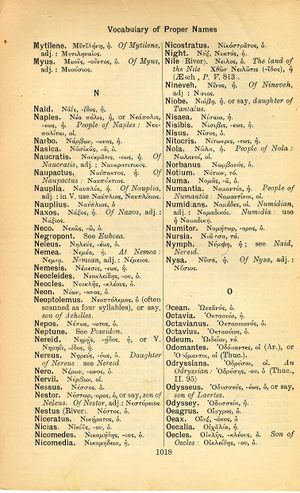Numa: Difference between revisions
From LSJ
πῶς δ' οὐκ ἀρίστη; τίς δ' ἐναντιώσεται; τί χρὴ γενέσθαι τὴν ὑπερβεβλημένην γυναῖκα; (Euripides' Alcestis 152-54) → How is she not noblest? Who will deny it? What must a woman have become to surpass her?
(Gf-D_6) |
(3_9) |
||
| Line 8: | Line 8: | ||
{{Gaffiot | {{Gaffiot | ||
|gf=<b>Nŭma</b>,¹⁰ æ, m., [[Numa]] [[Pompilius]] [deuxième roi de Rome] : Liv. 1, 18, 1 ; Cic. Rep. 2, 25 ; Ov. F. 2, 69. | |gf=<b>Nŭma</b>,¹⁰ æ, m., [[Numa]] [[Pompilius]] [deuxième roi de Rome] : Liv. 1, 18, 1 ; Cic. Rep. 2, 25 ; Ov. F. 2, 69. | ||
}} | |||
{{Georges | |||
|georg=Numa, ae, m. ([[Stamm]] NUM, wov. [[auch]] [[numerus]], [[num]]-[[mus]]), der [[Ordner]], [[Gesetzgeber]], [[Name]] [[des]] zweiten röm. Königs, s. [[Pompilius]]das Nähere. | |||
}} | }} | ||
Revision as of 09:30, 15 August 2017
English > Greek (Woodhouse)
Νομᾶς, -ᾶ, ὁ.
Latin > English (Lewis & Short)
Nŭma: ae, m.,
I a Roman proper name.
I Numa Pompilius, the second king of Rome, Liv. 1, 18 sq.; Cic. Rep. 2, 13, 25; 2, 18, 33; Ov. F. 2, 69; id. ib. 3, 305 sqq.; Juv 3, 16; 8, 156 al.—
II Numa Marcius (Martius), a Sabine, a friend of the former and high-priest, Liv. 1, 20; Tac. A. 6, 11.
Latin > French (Gaffiot 2016)
Nŭma,¹⁰ æ, m., Numa Pompilius [deuxième roi de Rome] : Liv. 1, 18, 1 ; Cic. Rep. 2, 25 ; Ov. F. 2, 69.
Latin > German (Georges)
Numa, ae, m. (Stamm NUM, wov. auch numerus, num-mus), der Ordner, Gesetzgeber, Name des zweiten röm. Königs, s. Pompiliusdas Nähere.

